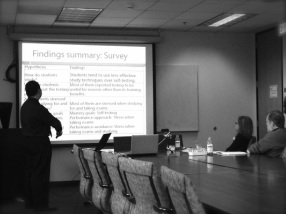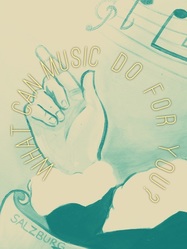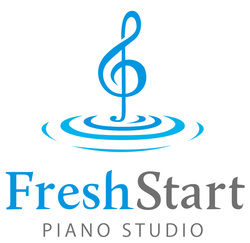
Have you ever wondered what somebody with a Ph.D. in Education thinks about music education? Well I'm here to tell you--your wait is over!
Okay, even if you've never wondered that in your life, my brother recently passed his dissertation defense and received his Ph.D. in Education from the University of California, Irvine. If you want proof, to the left is a picture of him making his presentation in for the professors. As you will see, his writing is a lot more research-y than my blog posts, enjoy :) What can music do for you?
If you are reading this, you are probably interested in learning something about music. To many people, namely parents, music holds this magical power that produces more benefits than just getting better at music. A popular marketing slogan from Taiwan says, “kids who learn music will not behave badly.” Let’s overlook the fact that this slogan doesn’t actually say your kids will turn out good, but merely not be bad. The selling point of this slogan is the added moral and behavioral benefits of music--as if learning music itself is not enough. You rarely hear people talk about how learning math can “make you smarter”, yet people do talk about taking music lessons as a way to “get smarter.” What exactly can music do for you? What are the facts and fictions about music? This post hopes to answer some of your questions.
The Mozart Effect
I, a music lover, take no pleasure in bursting the bubble that attracts so many into listening to Mozart, but regardless of what 1,733 products on Amazon.com tell you, listening to Mozart does not make you or your babies smarter. From the original study, the little benefit of listening to classical music only lasts 10-15 minutes, and it was only for college students completing one specific task. To my knowledge, there has never been a Mozart effect study done on babies. Parents and parents-to-be, instead of playing Mozart to your children, your children will appreciate you more if you just talk to them.
Verbal intelligence
Music training, however, does help in other capacities. Researchers compared 32 children between 4 and 6 years old who received visual-art training to 32 children who received music training in rhythm, pitch, melody, voice, and basic musical concepts. They found that after only 20 days of training, the music group children showed better verbal intelligence. They reasoned that the effects of music training on verbal performance were products of enhanced attention and verbal memory (Moreno, Bialystok, Barac, Schellenberg, Cepeda, & Chau, 2011)
Auditory information processing
Another study published this year showed that music enhances children’s capacity to process auditory information. For this study researchers divided fifty 7-8 years old children into music or natural science group and gave them 45 minutes of weekly training over a period of 18 months. The researchers suggested that children in the music group might develop a greater storage capacity for sounds and more efficient rehearsal strategies to remember words (Roden, Grube, Bongard, & Kreutz, 2013). Both of these abilities are vital when it comes to language learning.
Self-esteem enhancement
When I first moved to the U.S., I didn’t speak much English. Fortunately for me, I knew how to play the trumpet, so I joined the school band. I used music as a way to express and establish my identity at school. Music can be participated across all cultures, ages, gender, and abilities, and thus, positively influence children self-development. Indeed, a study by Costa-Giomi (2004) indicated that children with three years of piano instruction improved their self-esteem significantly more than children who did not receive instruction.
What is music good for?
Music can improve various areas of your life. Beside the cognitive benefits that were mentioned here, there is still much research to be done to empirically understand the side benefits of music. Yes, side benefits. Study music for the sake of music. Music is a beautiful instrument for people to communicate and express themselves. For once, instead of asking what can music do for you? Do more music, for yourself.
Want to contribute to the discussion?
Share your thoughts with us in the comments below. I'm always looking to learn and share more information with others and would love to hear from you!
Also, if you found this information come join us and like our studio's facebook page!
0 Comments
Your comment will be posted after it is approved.
Leave a Reply. |
FreshStart Piano Studio in Irvine offers piano lessons for beginners between the ages of 4-adults and a fresh start for intermediate & advanced students. Enroll in piano lessons now!
Archives
December 2023
|


 RSS Feed
RSS Feed